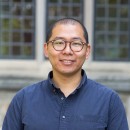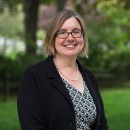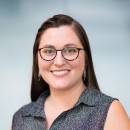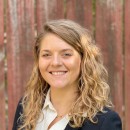School of Social Work News
Pages
 Preparing for Fall Semester 2020
Preparing for Fall Semester 2020Dean Lynn Videka has been named a chair of the U-M Provost’s Fall 2020 Planning Initiative. She is a member of the overall Fall 2020 Coordinating Committee and is chairing the Curricular Support, Extra and Co-curricular Activities, and Engaged Learning Committee. Videka’s committee is part of a larger, coordinating committee chaired by Interim Provost Susan Collins, which is exploring ways the university can move forward with research, teaching and service during the pandemic. Videka’s committee will focus on ensuring equitable access to key academic resources and developing guidelines to support and enhance U-M undergraduate and graduate education in fall 2020.
- May 7, 2020
- Learn more »
 Todd Herrenkohl Appointed Editor in Chief of the Journal of the Society for Social Work and Research
Todd Herrenkohl Appointed Editor in Chief of the Journal of the Society for Social Work and ResearchTodd I. Herrenkohl the Marion Elizabeth Blue Professor of Children and Families is the editor in chief of the Journal of the Society for Social Work and Research (JSSWR). The journal is a peer-reviewed publication dedicated to presenting innovative, rigorous original research on social problems, intervention programs, and policies. “We are excited to welcome Dr. Herrenkohl as JSSWR’s editor-in-chief,” says Luis H. Zayas, president of the Society for Social Work and Research (SSWR) Board of Directors. “I’m certain that Todd will continue the journal’s upward trajectory and legacy of excellence, bringing new ideas to further advance social work research, knowledge, and impact." Herrenkohl will serve a 5-year term, 2020–2025, during which time he also will head the JSSWR Editorial Board and serve as a member of the SSWR Committee on Publications.
- May 4, 2020
- Learn more »
- Julie Cushman Selected as the Recipient of the 2020 Distinguished Lecturer Award
LEO Lecturer Julie Cushman has been selected as the recipient of the 2020 Distinguished Lecturer Award. For over twenty years, her exceptional dedication and commitment to social work values have made a positive impact on both the education of students and the climate of the School.
Cushman has taught a wide variety of classes and developed innovative ways to support student growth with opportunities outside the classroom. Most notably, she worked over many years with students to develop an experiential learning game, “Power: A Game of Positionality and Intersectionality.” Designed to teach complex adaptive change theory and intersectionality, the game is used in several courses at the School as well as at the U-M School of Public Health.
- May 4, 2020
 The Stress of Parenting During a Pandemic
The Stress of Parenting During a PandemicAssociate Professor Shawna Lee, author of a recent study on the stress of parenting amid this crisis talks with Tonya Mosley from Here & Now a National Public Radio live midday news program.
- May 4, 2020
- Learn more »

 COVID-19 Pandemic Disrupts HIV Continuum of Care and Prevention
COVID-19 Pandemic Disrupts HIV Continuum of Care and PreventionProfessor Rogério M Pinto and Assistant Professor Sunggeun (Ethan) Park assess how the COVID-19 pandemic is disrupting HIV care and prevention including testing, pre-exposure prophylaxis (PrEP) and primary care visits. Their new research lays out a plan of action to move through the pandemic, as well as the end of the HIV epidemic, in this decade.
- April 29, 2020
- Learn more »
 Beth Sherman 2020 Teacher of the Year
Beth Sherman 2020 Teacher of the YearClinical Associate Professor Beth Sherman was selected as the 2020 Student Union Teacher of the Year. Each year, the Student Union recognizes a professor at the School whose skills, dedication, understanding and commitment have made a positive impact on the lives of students. Nominations from students also consider service and contribution to the School’s climate.
“Over the years I have been incredibly honored to be a part of the University of Michigan School of Social Work community, helping to support our students on their paths to becoming kind, strong, social justice seeking, and capable social workers. In the current uncertainty, to have my efforts appreciated by the ones who matter most to me, means everything,” says Sherman.
- April 29, 2020
- Learn more »
 Lauren White, Joint PhD Student NIMH Funded to Support Youth Suicide Prevention
Lauren White, Joint PhD Student NIMH Funded to Support Youth Suicide PreventionThe National Institute of Mental Health is funding Lauren White, Joint PhD student in Social Psychology and Social Work, to study a new suicide prevention model, Promoting Community Conversations About Research to End Suicide. The program is a health intervention designed, supported and implemented by remote communities in Northwest Alaska to decrease youth suicide. Professor Lisa Wexler is the principal investigator.
- April 27, 2020
 We Can’t Forget Michigan's Abused and Neglected Children During COVID-19
We Can’t Forget Michigan's Abused and Neglected Children During COVID-19Associate Professor Shawna Lee and members of the Michigan Child Welfare Inter-University Consortium wrote an op-ed in the Detroit Free Press,” We can’t forget Michigan's abused and neglected children during COVID-19.”
- April 27, 2020
- Learn more »
- Social Work Practice, Policy and Research MasterTrack Online Certificate - Starting September 2020
Master’s-level learners have a new innovative and flexible online MasterTrack Certificate program, offered on Coursera. The Social Work MasterTrack program is focused on research, policy and practice. Six courses address advocacy for diversity, social justice and change and emphasize practice with individuals, families, small groups and community organizations.
Students can earn a certificate or, upon successful completion of all courses, may apply for admission to the 45 credit Master of Social Work degree program, which has been offered on campus and will also be offered via a new online format, beginning spring 2021.
“Completing the MasterTrack program will allow students who want to pursue an MSW degree to waive an entire semester, which equates to significant cost savings,” said Barb Hiltz, lead faculty member for the MasterTrack and director of the MSW program.
Michigan Social Work faculty and staff have partnered with the University of Michigan Academic Innovation and Coursera to develop Social Work: Practice, Policy and Research MasterTrack Certificate.
- April 21, 2020
- Learn more »
 Sara Stein Talks to WWJ 950 About MI Frontline Support
Sara Stein Talks to WWJ 950 About MI Frontline SupportSara Stein, Joint PhD student social work and psychology discussed MI Frontline Support a program offering mental health care to essential workers during the Coronavirus pandemic. The program makes it easier for frontline workers to connect with licensed clinicians.
- April 20, 2020
- Learn more »